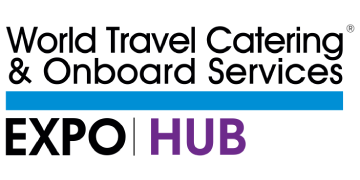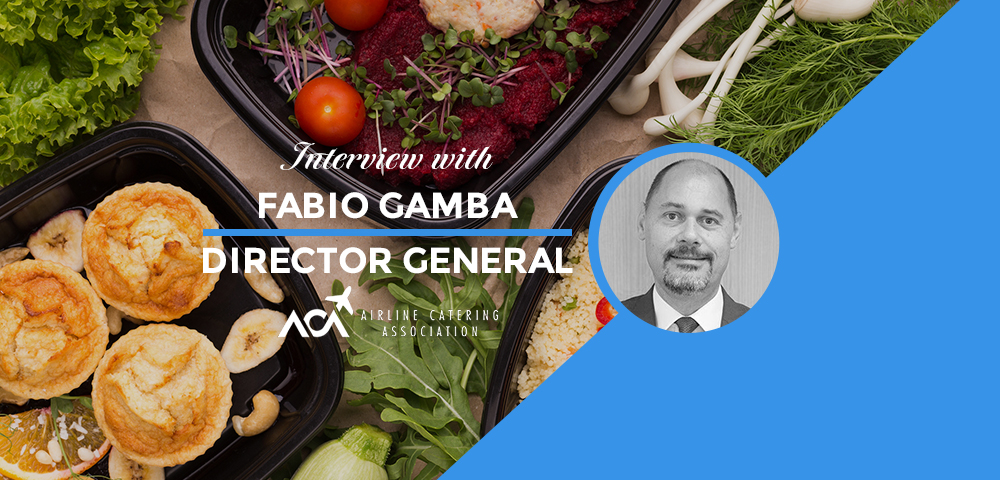The Airline Catering Association represents, promotes, and defends the common interests of the airline catering industry. Fabio Gamba, Director General, Airline Catering Association (ACA) reveals the impact of the pandemic and the new ACA COVID-19 guidelines providing advice to catering suppliers working in the aviation industry.
Food catering services have always operated under strict health and safety guidelines, how has this changed in light of the COVID-19 pandemic?
Our industry has always met the needs of our passengers, that has not changed. First off, I want to make it clear that food is not a vector in spreading the disease, according to the WHO and other international bodies.
The Airline Catering Association has recently published a set of guidelines to ensure that all food that leaves our kitchens is safe during the coronavirus pandemic. We have created these guidelines to restore trust and to ensure that airline catering providers around the world can continue to meet demand despite the coronavirus challenge.
We call our guidelines the 4P’s because they cover every process involved in getting food to passengers: People; Premises; Policies/Processes/Procedures; and Procurement.
What additional safety precautions have been introduced to protect those working within the industry and reassure passengers?
Our guidelines are designed to be responsive to local situations at various levels of risk. Safety measures can be ramped up if a virus hotspot is detected. Even in low-risk situations, kitchens must always be ready to adopt changes and to ensure business continuity. This means knowing how premises should be configured at each pandemic risk level.
For example: In medium- to high-risk levels, kitchens must maintain physical distance, all employees must wear personal protective equipment (PPE) and suppliers must comply with guidelines through a health certificate accompanying delivery notes, for example.
What are the ACA COVID-19 guidelines designed to achieve?
The COVID-19 guidelines have been designed to continue to accommodate demand in a safe and efficient way. To do so, the guidelines cover every process involved in getting food to passengers. We want to restore the confidence that the industry and passengers may have lost in the pandemic.
“We call our guidelines the 4P’s because they cover every process involved in getting food to passengers: People; Premises; Policies/Processes/Procedures; and Procurement.”
How were the guidelines created? What input did the industry (caterers/suppliers and airlines) have in their creation?
These guidelines were created by the industry, for the industry. ACA and its members developed the ACA COVID-19 Guidelines together, building on global and local regulations. The standardised, best-practice framework we provide benefits airline catering companies around the world and the passengers they serve. The framework helps create business-specific procedures, guidance documents and training materials for each unique location and situation.
What are the key changes that caterers/suppliers need to be aware of?
The biggest change to caterers and suppliers is that they must remain at the ready to make necessary changes immediately when and where they are needed. Kitchens must be ready to immediately ramp up prevention measures if a local outbreak is discovered while ensuring business continuity.
Every airport, airline and aircraft are different. Our members and partners need to be aware of local situations and regulations. We have included checklists and additional controls tailored to varying risk-levels to ensure business continuity no matter the local situation.
All of this is covered in our guidelines and I have complete trust in the ability of our industry to adapt.
What challenges/opportunities do you see for the future of airline catering?
Summer travel is picking back up in Europe. This is an opportunity for the industry to meet increasing demand. With our guidelines in place, on top of our commitment to local and international regulations, we are ready and eager to meet increasing passenger needs in the near future.
In the long-term, our industry is ready to face similar public health crises in the future. Viruses such as corona will continue to challenge our industry. While we sincerely hope such a crisis does not happen again, the airline catering industry can use the guidelines we have developed to continue to serve food to all passengers safely and efficiently.
Have procurement timelines had to change or a switch to more local ingredients as they can’t rely on deliveries from further afield?
We have not faced large scale disruptions to our business continuity, that I am aware of. That said, it is true we sense airlines are interested in offering more local products, both as a general trend aiming at promoting more sustainable catering and to avoid having to rely on deliveries that could prove problematic during a pandemic. So indeed, procurement timelines have changed, and the industry has adapted to it, but so many things have changed since February-March!
“All of this is covered in our guidelines and I have complete trust in the ability of our industry to adapt.”
Are there any misconceptions about inflight catering and its operation while social distancing is in place?
I won’t reiterate the common misconception about food as being a potential vector of Covid-19, we have already covered that many times. Perhaps the major issue is related to cabin crew and the contact with passengers whilst distributing food. Personally, I don’t see any issue with that: if the middle seat is allowed, as it seems to be the case, and social distancing reduced to a few centimetres amongst passengers, I don’t see why passing on food should be an issue at all. On that particular point, I am disappointed that this was not recognised by the EASA or the European Commission in their respective Communication and Guidelines.
What innovations/trends have emerged in light of the changing protocols/processes adopted by caterers/suppliers?
The process of creating these guidelines has shown that cooperation is key. ACA has always facilitated cooperation within the industry and with our partners. The COVID-19 pandemic and our coordinated response has highlighted how industry cooperation can solve large scale challenges. Even after the pandemic subsides, I see the cooperative spirit remaining. We achieved so much so quickly, and I see no end to our combined efforts.
How can caterers/airlines/suppliers get involved with ACA and contribute to these guidelines?
Anyone who wants to learn more about ACA or about our COVID-19 guidelines can visit our website at https://www.aca.catering/. We have posted the guidelines and news, as well as contact information and membership information. We also have an active LinkedIn account where we keep our followers appraised of the latest developments.
I look forward to hearing from anyone and everyone who has a stake in inflight catering.

